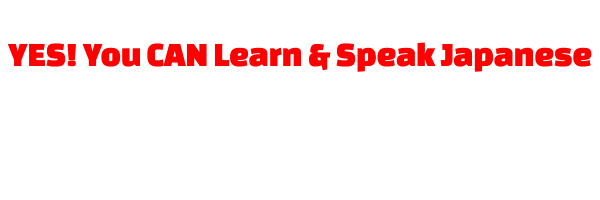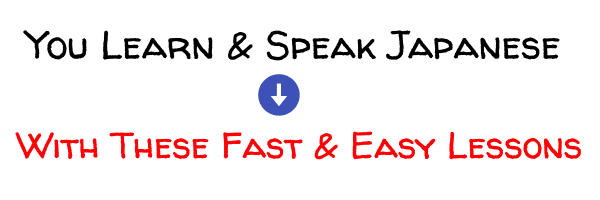“I want to learn Japanese”
Oh, hello!
Do you really want learn it? And how do you say that in Japanese? You say “Nihongo ga manabitai desu.” In Japanese, that would look like this: 日本語が学びたいです。
In this article, you will indeed learn some Japanese. You will: ① learn how to say “I want to learn Japanese” in many ways, and ② actually get some ways to learn Japanese: Apps, Textbooks and Japanese courses.
Ready? Keep reading.
“I want to learn Japanese.” Useful Phrases for Learners
Let’s jump into the “I want to learn Japanese” phrases first. Want to read? Speak? Understand? Check these phrases out and repeat them out loud.
1. I want to learn Japanese.
- 日本語が学びたいです。
- Nihongo wo manabitai desu.
Okay, so if you don’t already know, “Nihongo” means Japanese. Then, we have the verb, to learn, which is “manabu.” But, in the phrase above, it ends with”tai.” So, first thing you should remember right now: -tai is how you express your “wants” in Japanese. You take a verb and conjugate it into the tai form.
Since this article is all about “I want to….” you will see the “tai” again and again.
And that’s good. You will remember it through constant repetition.

2. I want to be able to read Japanese.
- 日本語で読めるようになりたいです。
- Nihongo de yomeru you ni naritai desu.
See? There’s the “tai” again! There’s a new word here: yomeru. It’s the verb “yomu” or “to read” but conjugated in the potential form where you want to express whether you are able to do something. So, “yomeru” means “to be able to read.”
Finally, we have “tai” form of the verb “naru” which means “to become.”
Are you interested in reading Japanese? Then, you might want some Japanese textbooks.
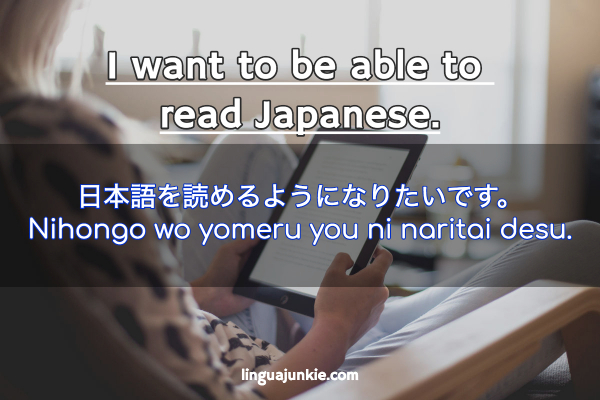
3. I will learn Japanese.
- 日本語を学びます。
- Nihongo wo manabimasu.
Are you confident?
Are you confident that you will learn Japanese? Yes? Then learn this phrase!
Look! We ran into the verb,”manabu,” again. Remember? It means “to learn.”
Now, this is not so much of “want” phrase. But, if you want to learn Japanese and are confident about it, you will want to express your rock-solid beliefs and plans. That yes, you will learn and nothing can stop you.
So, when you decide to start learning, use this phrase.

4. I want to speak Japanese better.
- 日本語がもっとうまく話せるようになりたいです。
- Nihongo ga motto umaku hanaseru you ni naritai desu.
Okay, there are some more new words here.
“Motto” means “more.” Then, “umaku (or umai)” means “good” or “better.” Then we have the word “hanaseru,” meaning “to speak” and it is in the potential form . So, “hanaseru” means “to be able to speak.”
Finally we have this interesting pair: “you ni.” It’s a grammar form that means “so that.”

5. I want to be better at Japanese.
- 日本語がもっとうまくなりたい。
- Nihongo ga motto umaku naritai.
By now, you already know these words.
At first, you say “I want to learn Japanese.” Then, you start learning, and then you say “I want to be even better.” That’s where this phrase comes in.
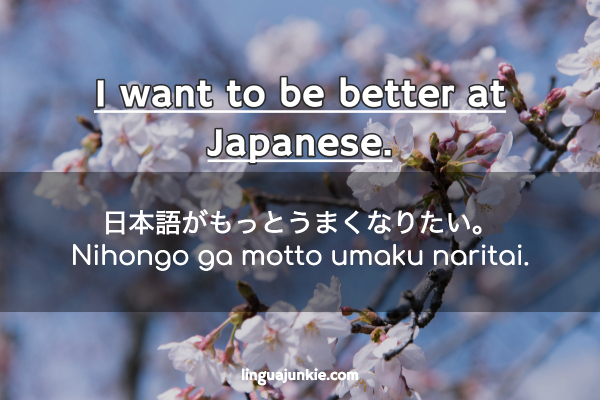
6. I want to become fluent in Japanese.
- 日本語がペラペラになりたい。
- Nihongo ga pera pera ni naritai.
Oh, new word! Just so you know, “pera pera” means “fluent.”
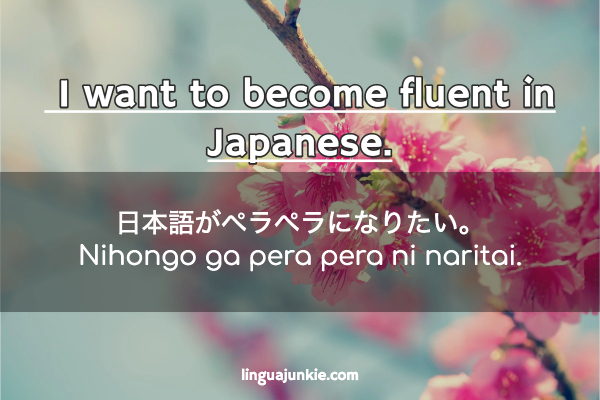
7. I want to speak Japanese fluently
- 日本語をペラペラにしゃべりたい。
- Nihongo wo pera pera ni shaberitai.
You learned “pera pera” above already but there’s a new word here. It’s “shaberitai” which means “want to talk.” Yes, it’s in the “tai” form. The original form of the verb is “shaberu” and it means “to talk.”
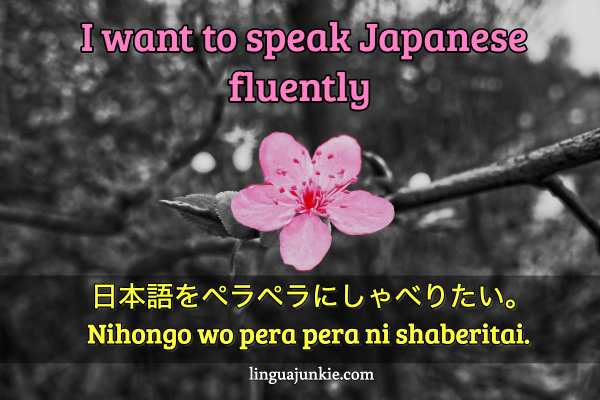
8. I want to understand Japanese.
- 日本語がわかりたい。
- Nihongo ga wakaritai.
“Wakaritai” comes from the verb “wakaru” which means “to understand.”

Do you want to understand Japanese? Then, I suggest you get an online course right here. Or, you can listen to Japanese audio lessons and start understanding in minutes.
9. I’ll start studying Japanese today.
- 今日から私は日本語の勉強をする。
- Kyou kara watashi wa nihongo no benkyou wo suru.
“Kyou” means “today” and “kara” means from. So, from today! The next word is a super common word: “watashi.” It means “I” and you should never forget that. Finally, the only other new word here is “benkyou” which means study.

10. I’d like to study Japanese…
- 日本語を勉強したいなぁ
- Nihongo wo benkyou shitai naa
Woah! What is this “naa”? I’ll tell you. It’s a suffix you use to express your thoughts, feelings and overall wishful thinking. Kind of like, if you were sitting daydreaming, sighing, and suddenly thought to yourself: “ah, wouldn’t it be great to actually speak Japanese?” That’s when you use the “na!”
So, this line is really up to interpretation and can be translated in many ways. It depends on how you feel. Aside from “I’d like to study Japanese…,” it can also be interpreted as “I want to learn some Japanese…”

11. It’d be great to know Japanese…
- 日本語が
できればいいなぁ - Nihongo ga dekireba iina
This is another way to express your desire to learn Japanese.
Oh, there is a new grammar point and word here too. Let’s do the word first. It’s “dekiru” which is a verb and means “to be able.” But, it’s conjugated with the “-ba” ending which kind of means “if,” “when” or “if only.” Finally, there’s the “ii na.” “Ii” means “good” and when combined with the “na,” it’s a “would be good” wishful-thinking type of phrase.
So, this line is kind of like: “It would be great ig I knew (was able/capable of) Japanese.”
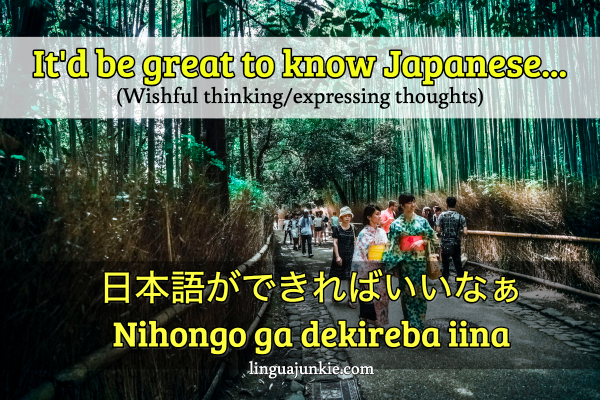
12. My dream is to be fluent in Japanese
- 私の夢は日本語がペラペラになりたいです
- Watashi no yume wa nihongo ga perapera ni naritai desu
What’s your dream?
Since you’re reading this article, it should be Japanese. Oh, did you notice a new word here? Yes, “yume.” “Yume” means dream.

13. My goal is to be able to speak Japanese
- 私の目標は日本語が話せるようになる事です
- Watashi no mokuhyou wa nihongo ga hanaseru you ni naru koto desu
What about goals? What’s your goal in life?
Do you want to talk about goals in Japanese? Then, you’ll notice that it is “mokuhyou” in Japanese. That’s the new word that you should know.
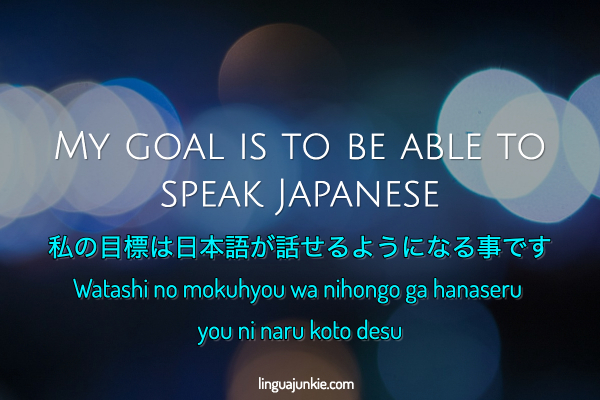
Now, you can say “I want to learn Japanese.” You can also talk about reading, speaking and understanding this language. Just re-read and repeat these lines some more if you want to master them.
But wait, what’s that? You say you want to learn MORE?
Well, my friend, check out the links below for resources:
- Japanese Learning Program for Beginners – JapanesePod101.com
- How to Learn Japanese in 5 Minutes (Study Tools Inside)
- For Beginners: The 7 Best Japanese Textbooks & Dictionaries
Written by the Main Junkie
P.S. Want to learn & speak the Japanese language?
Check out JapanesePod101, a complete Japanese learning program with 2,000+ audio and video lessons, apps, study tools, eBooks and PDF lesson notes. I think their lessons can and will help you learn and speak Japanese.
Click here get a FREE Lifetime Account & speak Japanese with fast + easy lessons
